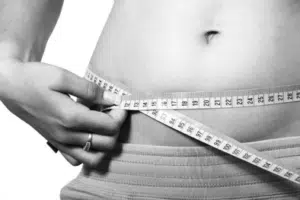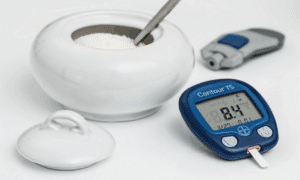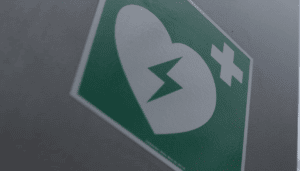Keto Benefits and Side Effects

The keto diet is touted as an effective tool for weight loss and the health benefits extend much further and beyond. However, there are also side effects to keto which you need to be aware of.
To help you weigh it all up I’m going to talk you through the highs and lows of the keto benefits and side effects.
Top Keto Benefits
Here’s a roundup of the top keto benefits according to science.
#1 Effective Tool for Weight Loss and Obesity

The primary reason most people try the keto diet is because they want to lose weight.
The keto diet promotes fat burning and appetite control which are both prime candidates for aiding weight loss. In fact, the keto diet reduces hunger and lowers food intake more than other diets. 1
Experts suggest it’s all down to the metabolic effects why it’s a far more effective way to lose weight than other calorie controlled diets. 2 3 4
Therefore it stands to reason why the keto diet is a solid approach against the fight of obesity. 5 6
#2 Improves and Reduces Risk for Diabetes

Diabetes is a metabolic disease that is caused by irregularities in blood sugar regulations through insulin sensitivities. Type 2 diabetes is mostly preventable through a change in lifestyle. 7
The keto diet has clearly shown the ability to improve and reduce the risk of type 2 diabetes.
The keto diet leads to better blood sugar control. Not only because of a lower sugar intake but it also improves insulin sensitivity. Higher levels of ketones have also shown a favourable effect with glycemic control in diabetes 8
In fact, studies suggest that even by following this type of diet for as little as two weeks, it can improve insulin resistance by as much as 75 percent. 9
In another study, volunteers followed the keto diet by reducing their carb intake to less than 20 grams per day. This method was so effective that 95 percent of participants either reduced or eliminated their need for diabetes medication altogether. 10
#3 Improves Epilepsy
You may be surprised to know the keto diet has been used as successful treatment for childhood epilepsy as far back as the 1920’s.
The mechanisms still remain unclear as to how the keto diet prevents seizures. However it’s thought the ketone acetone, which is produced during ketosis, displays anticonvulsant activity. 11
In many cases, the keto diet reduced seizures by up to 40 percent and therefore is still strongly supported by experts. In fact it’s only taken a step back because the introduction of anticonvulsant drugs. 12 13
#4 Keeps Your Heart Healthy

Cardiovascular disease is one of the biggest killers and the keto diet can improve some of the risk factors which contribute to this disease: 14
- Lowers blood pressure 15
- Lowers LDL (bad) cholesterol 16
- Increases HDL (good) cholesterol 17
- Lowers triglycerides which are a type of fat and a risk factor for heart disease. 18
#5 Can Improve Degenerative Diseases of the Brain
There is increasing evidence the keto diet has neuro-protective properties that could both reduce risk and slow down degenerative diseases of the brain. 19
Studies suggest the keto diet can help people suffering with Alzheimer’s. It’s been reported that a high carb intake actually worsens cognitive behaviour. However on a low carb diet like keto, it results in improvement of memory performance. 20
And Parkinson’s disease patients experienced a 43% reduction in disease rating scores after only 28 days on the keto diet. 21
Other Keto Benefits
#1 Increases energy

Even when you cut back on the body’s traditional energy supply, the keto diet can still boost your energy levels. It all comes down to the ketones creating a steadier level of energy.
#2 Reduces Appetite
Foods that are high in fat and proteins are all satiating food types. This means you will have that “full” feeling in your stomach for longer.
#3 Improves Skin
The keto diet could also improve your skin and reduce the risk of acne breakouts. 22
#4 Helps Brain Trauma
Increased levels of ketones appear to improve brain trauma therefore speeding up the recovery time from injury. 23 24
#5 Reduces Severity of Cancer
Although research is limited the keto diet has shown benefits and promise towards treatment in certain forms of cancer. 25
Experts suggest the keto diet could form an alternative therapy towards the fight against brain cancer. Evidence indicates that the keto diet is capable of slowing down the growth of brain tumors. 26
The reduction of tumor growth doesn’t just apply to the brain. Additional studies have also shown similar results in colon, gastric, and prostate cancers. 27
The keto diet could also prove to enhance traditional cancer treatments. The state of ketosis has shown to encourage response and sensitivity to both chemo and radio therapy treatments. 28 29
#6 Polycystic Ovary Syndrome (PCOS)
Polycystic ovary syndrome is where tiny cysts form on the ovaries and impacts upon hormone balances. This leads to complications such as insulin resistance, irregular periods, and even fertility problems.
By following the keto diet for only 24 weeks women not only saw improvements to weight loss, but hormone levels and insulin resistance greatly improved. 30
Keto Side Effects

It will come as no surprise there are drawbacks to the keto diet and they form a collection of side effects. Some are quite common whereas others aren’t, but still need to be addressed.
I would like to share them with you along with some tips on how to combat them.
#1 Keto Flu
When commencing the keto diet, one of the most common side effects experienced is what’s been nicknamed as “keto flu”.
This episode will usually spring up a few days into a strict keto diet and it’s common to feel symptoms of:
- Headaches
- Irritability
- Tiredness
- Nausea
- Brain fog
This is because your body is going through a period of upheaval due to carb and sugar restriction whilst trying to adapt to the changes. Carb-laden foods encourage you to retain water, therefore when you cut them out, water retention rapidly disperses.
This is often a cause of rapid weight loss in the early stages, but it also can lead to dehydration and loss of salts from the body. Hence you get the “keto flu”. If you do feel under the weather, it’s usually short lived and normally takes around a week to pass.
To minimize catching “keto flu,” drink more water to keep your fluids up and top up your electrolytes with broth or supplements.
#2 Other Side Effects
- Leg Cramps
- Constipation
- Diarrhea
- “Keto” Breath
- Urinating frequently
- Increased thirst
- Cravings
- Weakness
- Heart palpitations
Believe it or not, “keto breath” is a positive sign. It’s caused by acetone, a form of ketone that is released in the breath when you are in ketosis. 31
Again, this is usually a temporary side effect of the keto diet and it should pass. However if it prolongs and you find your friends standing at arm’s length, you may have to introduce a few more carbs back into the diet.
Irregular bowel movements, either too frequent or sporadic, are down to change in dietary habits. For constipation, keep your fluids up and try to eat plenty of keto-friendly veggies. This too should ease once the body get used to the keto diet.
Frequent urination and increased thirst are because ketosis is in progress. Insulin levels are dropping therefore the sodium isn’t being absorbed like it should, thus the diuretic effect and more trips to the bathroom. Keep drinking and your minerals in order. 32
Heart palpitations might sound drastic, but it’s another tell-tale sign you are dehydrated or lacking in salts. 33
Important note: If you have blood pressure irregularities or diabetes and experience palpitations, there could be a chance your medication needs to be reassessed. Therefore check in with your doctor if you have any concerns.
#3 Ketoacidosis
This condition deserves a special mention because for some people embarking on the keto diet, it raises concern.
Many people often confuse “ketosis” and “ketoacidosis”, granted the names sound very similar but they are two separate entities in their own right.
Ketosis is a harmless metabolic process which is caused by reduced blood sugar levels in the body. When on the keto diet, it’s something you strive for.
Whereas ketoacidosis is a life threatening condition of which type 1 diabetics are at risk. This is caused by abnormally high levels of both ketones and blood sugars, and, in fact, it’s one of the most common medical emergencies seen in diabetics. 34 35 36
And where does the concern lie? Elevated levels of ketones in the body are also generated following the keto diet. However, unless you have a predisposition for the complication (i.e. diabetes), it’s very unlikely. 37
Final Word – The Keto Benefits and Side Effects
There you have it – the keto benefits and side effects.
Yes, there are side effects, but these can be prevented with a little forward thinking and most of them are only experienced short term. However one thing is clear, the benefits are for the long haul.
Source
- https://www.ncbi.nlm.nih.gov/pubmed/18175736
- https://www.ncbi.nlm.nih.gov/pubmed/18833988
- https://www.ncbi.nlm.nih.gov/pubmed/23651522
- https://www.ncbi.nlm.nih.gov/pubmed/17971178
- https://www.ncbi.nlm.nih.gov/m/pubmed/27623967/
- https://www.ncbi.nlm.nih.gov/pmc/articles/PMC3945587/
- http://www.who.int/diabetes/en/
- https://www.ncbi.nlm.nih.gov/pmc/articles/PMC3826507/
- https://www.ncbi.nlm.nih.gov/pubmed/15767618
- https://www.ncbi.nlm.nih.gov/pmc/articles/PMC2633336/
- https://www.ncbi.nlm.nih.gov/pubmed/17509459
- https://www.ncbi.nlm.nih.gov/pmc/articles/PMC3826507/
- https://www.ncbi.nlm.nih.gov/pmc/articles/PMC2902940/
- https://www.cdc.gov/heartdisease/facts.htm
- https://www.ncbi.nlm.nih.gov/pubmed/22905670
- https://www.ncbi.nlm.nih.gov/pmc/articles/PMC3826507/#bib28
- https://www.ncbi.nlm.nih.gov/pubmed/22905670
- https://www.ncbi.nlm.nih.gov/pubmed/15148063
- https://www.ncbi.nlm.nih.gov/pubmed/18990309
- https://www.ncbi.nlm.nih.gov/pmc/articles/PMC2367001/
- https://www.ncbi.nlm.nih.gov/pmc/articles/PMC2367001/
- https://www.ncbi.nlm.nih.gov/pubmed/22327146
- https://www.ncbi.nlm.nih.gov/pubmed/16180224
- https://www.ncbi.nlm.nih.gov/pmc/articles/PMC2367001/
- https://www.ncbi.nlm.nih.gov/pubmed/27557542
- https://www.ncbi.nlm.nih.gov/pubmed/19049606
- https://www.ncbi.nlm.nih.gov/pmc/articles/PMC4215472/
- https://www.ncbi.nlm.nih.gov/pmc/articles/PMC4215472/
- http://journals.plos.org/plosone/article?id=10.1371/journal.pone.0036197
- https://www.ncbi.nlm.nih.gov/pmc/articles/PMC1334192/
- https://www.ncbi.nlm.nih.gov/pubmed/12081817
- https://link.springer.com/article/10.1007%2FBF00252649
- https://www.ncbi.nlm.nih.gov/pubmed/14672862
- https://www.ncbi.nlm.nih.gov/pubmed/22250030
- https://www.ncbi.nlm.nih.gov/pubmed/15871546
- https://www.ncbi.nlm.nih.gov/pmc/articles/PMC4488998/
- http://www.nejm.org/doi/full/10.1056/NEJMc052709#t=article